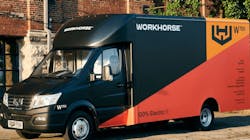Workhorse expands in California, adding second certified dealer there
Light- and medium-duty electric-vehicle startup Workhorse has added another California truck dealership certified to sell, service, and supply parts for the OEM’s Classes 4-6 vans built for delivery applications.
Los Angeles outlet Western Truck Exchange is partnering with Workhorse to also upfit the Cincinnati-based OEM’s vehicles, including its Class 4 W4 CCs and W750s. Workhorse’s certified dealer program was announced earlier this year and is developing a network of verified dealers that have passed the protocols to safely repair and maintain the electric components of the company’s vehicles, according to a company statement.
See also: Burr becomes first Workhorse distribution, service partner in New York
Workhorse has also established a training program that provides dealers with both hands-on and online training, including technical sales training. The program enables dealers to safely assist customers with vehicle maintenance in addition to providing strategies for vehicle deployment into their fleets. Workhorse certified dealers have also made investments in EV charging infrastructure, tooling, and building out their spare parts inventory to service the OEM’s vehicles.
Kingsburg Truck Center became the EV maker's first certified dealership in California in March.
"Western Truck Exchange occupies a significant end market opportunity in one of the most EV-friendly states in the U.S.,” the statement from Workhorse said of family-owned, fourth-generation WTE, which was established in 1922 and focuses now on truck sales, truck parts, truck repairs, truck rentals, and truck bodies with more than 100 trucks for sale on hand at any given time, over 20 technicians, and more than $150 million worth of truck parts in inventory.
Added CEO Rick Dauch: “We are continuing to build a strong foundation for both our dealers and end customers through the expansion of our Certified Dealer Program. Partnering with WTE allows us to grow our dealer network through a trusted operator in the critical California end market, which has some of the most favorable government incentives in the country. As we increase our manufacturing throughput in the coming months, we look forward to bringing more W4 CC and W750 models off the line for WTE to market and sell to its expansive customer base.”
See also: J.B. Hunt to order 13 Nikola electric trucks
The Western Truck Exchange announcement follows a busy month to two months for Workhorse.
Earlier this month, the startup OEM signed Burr Truck and Trailer Sales as its first distribution and service partner in New York state and the first dealership for its EVs in the northeastern U.S. That deal came just a couple of weeks after Workhorse said production had begun on its delayed Class 4 W750 delivery van and, at the same time, named its first certified dealer in Georgia, Smyrna Truck.
Said WTE President Dan Holtzman: “As fleet operators across California shift to electric alternatives, we appreciate the opportunity to partner with Workhorse at the forefront of the EV transition. Workhorse trucks provide a compelling zero-emission option for commercial vehicle operators, and we look forward to offering these vehicles to new purchasers as well as our longstanding customers who have relied on us to provide best-in-class vehicles and service for three generations.”
Company busy recovering from initial fits and starts
In the wake of resolution of a U.S. government investigation that started in late 2021, Workhorse decided to discontinue its Class 3 C-1000 step van late last year to focus on the W750, W4 CC, and the medium-duty Classes 5-6 W56. The company showcased the W56 to members of Congress, policymakers, and other federal officials on the Capitol grounds during a June 7 event in Washington, D.C., hosted by Calstart, after it debuted the W56 at Work Truck Week in March in Indianapolis. Workhorse is also developing package delivery drones, the Aero.
CEO Dauch also sent a letter to Workhorse stockholders, asking for their permission to increase the number of shares of the company’s common stock in connection with a special company meeting and in a bid to increase the startup OEM’s financing.
“We need to ensure we have the necessary financial resources to ‘complete the transition’ and are evaluating a range of options to fund our next phase of production and profitable growth,” Dauch said in the letter. “We are contemplating transactions involving common stock or the issuance of equity-linked securities, including convertible debt. These options will only be available to us if we have the flexibility to issue more shares of our stock."
About the Author
Scott Achelpohl
Managing Editor
Scott Achelpohl is a former FleetOwner managing editor who wrote for the publication from 2021 to 2023. Since 2023, he has served as managing editor of Endeavor Business Media's Smart Industry, a FleetOwner affiliate.

